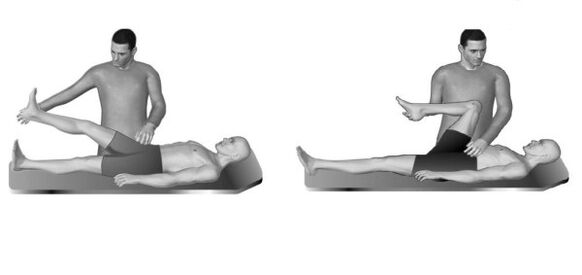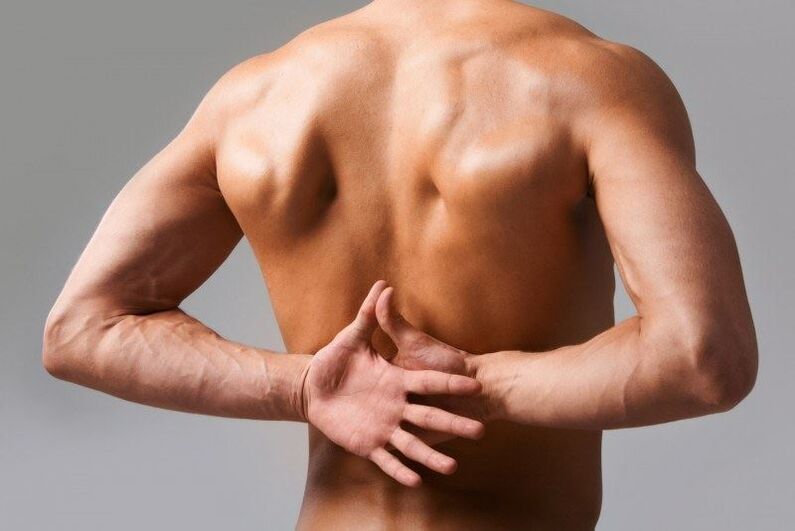
Osteochondrosis refers to degenerative-dystrophic lesions of the tissues of the spine and joints with progression. The more neglected the disease, the more pronounced are the symptoms that affect the person's lifestyle and ability to work. When the structure of the spine is damaged, a person has such problems, for example, how to live with pain, how to sleep with cervical osteochondrosis.
In practice, pathology of various parts of the spine, coccyx and joints is common. Previously, only people over the age of 25 were affected, but recently there has been a trend towards "rejuvenation" of the disease. Symptoms of juvenile or youthful osteochondrosis have become common.
The reasons
The causes of osteochondrosis can be different and depend on which part of the body is damaged. After any injury, the normal structure of the spine, the coccyx, is disturbed and the process of salt deposition and destruction of the disc structure begins. Overweight people, sedentary lifestyles and athletes are prone to it.
During pregnancy, the risk of disease increases due to weight gain and lack of vitamins. Lymph nodes also increase in size during pregnancy. The heart, other organs suffer from this and in combination with osteochondrosis it is very dangerous. The load on the shoulder, knee, neck and tailbone increases.
With age, almost every person suffers from osteochondrosis of the spine. Occupations associated with long periods of sitting, monotonous movements pose a threat to the neck, lower back and coccyx. The following conditions affect the onset of the disease:
- genetic predisposition;
- the course of pregnancy;
- endocrine, infectious diseases;
- poisoning or exposure to drugs, toxic and chemical substances;
- eating disorder, lifestyle.
In addition to the spine, there are often cases of osteochondrosis of the joints. Pathology is dangerous for the knee, elbow, shoulder joint, coccyx. When considering osteochondrosis of the knee joint, it is worth paying attention to causes such as obesity or malnutrition, a lifestyle associated with excessive load on the legs, as well as injuries or inflammatory processes in the body.
The muscles of the legs withstand enormous loads, unlike the joints, so the latter suffer more often.
Symptoms of damage to the elbow joint can be observed along with ongoing osteochondrosis of the cervical or thoracic region. Often the pathology is combined with arthritis or arthrosis. Injuries and constant straining of the elbow joint are predisposing factors.
Due to the constant movements of the neck and head, as well as the hands, over time the joints begin to wear out, salt deposits appear. This leads to osteochondrosis of the cervical vertebrae and the shoulder joint. The causes can be congenital, from compression of the nerve plexuses of the shoulder region, or from external factors. Injury to the neck, shoulder blades or hands causes osteochondrosis.
Osteochondrosis of the spine
Osteochondrosis of the spine occurs in different departments. The most common is the pathology of the lumbar department. The disease is associated with strong stress on the lower back and is dangerous due to the threat of pinching the sciatic nerve and the formation of a hernia.
There are symptoms such as aching pain, aggravated at night or during exercise. It is difficult to find the right position in sleep and rest. There may be "lumbago" of the lower back or impaired sensitivity of the legs, especially the knee joint, coccyx. During an exacerbation, the lymph nodes become inflamed.
The tailbone area is often affected, making it difficult to sit properly. If the sciatic nerve in the region of the coccyx is inflamed, then the pain descends to the lower limbs, buttocks, to the knee joint. To relieve pain, it is better for a person to take a comfortable position and drink antispasmodics, relaxants or analgesics.
During pregnancy, osteochondrosis of the lower back sometimes makes normal childbirth difficult. Then you need to perform the operation. Antispasmodics are taken during this period carefully so as not to harm the fetus.
In diseases of the spine, doctors use the identification of specific symptoms for diagnosis - Lasegue's symptom. For the neuropathologist, Lasegue's symptom is important in determining the extent of the disease.
Lasegue's symptom is always performed when a neurological disease is suspected. With the Lasegue method, the doctor slowly raises the standing leg up, preventing the knee from bending. Lasegue's sign is tested in three phases by bending and extending the leg. Based on the occurrence of pain in certain positions. During pregnancy, the Lasegue method is not used.

Osteochondrosis of the cervical region is often combined with lesions of the shoulder and elbow joints. Pains appear in the neck, head, spread to the shoulder blades and hands, pains in the heart appear. They are bought with antispasmodics. There is ringing in the ears, vision is deteriorating.
The pain is aggravated by movement of the neck, head or scapula. In the acute period, lymph nodes may be affected, muscle pain may occur in the neck and elbow joint. Then urgent treatment is needed to prevent complications in the heart, brain, blood vessels.
The patient is constantly tormented by the question: how to sleep with cervical osteochondrosis and correctly put his head on the pillow?
This is especially true for women during pregnancy. Only antispasmodics and treatment help.
Pathology of the thoracic region is less common. Symptoms of pain in the heart, shoulder area, shoulder girdle, neck are recorded. The lymph nodes are inflamed, sometimes because of the pain it is impossible to raise your arms, take a deep breath. Osteochondrosis is often confused with pain in the heart. If you take antispasmodics, the pain in the muscles, the heart disappears. If the disease is in an advanced stage, then antispasmodics do not always help and the following symptoms are added:
- violation of the sensitivity of the legs;
- increased pain at night, with movement, breathing;
- burning sensation, itching in the heart, region of the scapula, along the ribs.

Often in practice, osteochondrosis affects several parts of the spine. Symptoms during pregnancy are especially unpleasant when it is undesirable to take antispasmodics. Rescued in time started treatment.
Diagnosis of osteochondrosis includes conducting hardware tests, questioning and examination of the patient. It is important to pay attention to such specific signs as Lasegue's symptom. In order to rule out pathology in the heart and other internal organs, ultrasound, EKG is performed. X-rays, MRI, CT are performed to examine the spine.
Treatment of osteochondrosis should be long and complex. Treatment is divided into symptomatic therapy and rehabilitation. Against pain, muscle relaxants, NSAIDs, analgesics, antispasmodics are prescribed. Muscle relaxants can not only relieve pain for a long time, but also improve mobility. Relaxants have peripheral and central action. Which medicine to choose, the doctor decides.
Treatment includes a combination of physiotherapy, massage, reflexology. Treatment allows manual therapy, banks, ointments and folk methods.
Osteochondrosis of the joints
Often there are diseases of the elbow, knee, shoulder joint. Osteochondrosis of the knee joint often occurs in pregnant women and is accompanied by pain and limited mobility. The elbow joint is characterized by such symptoms as pain during movement, swelling, deformation. Incorrectly chosen position of the hand brings discomfort and pain. In the affected area, the lymph nodes become inflamed. In addition, lymph nodes can hurt not only in the affected area, but also capture neighboring lymph nodes.
In order to make the correct diagnosis, X-rays, CT, MRI are used, they are examined, palpated and Lasegue's symptom is checked. Complex treatment is required to restore the function of muscles and joints. You need to do massage, ERT, take antispasmodics, NSAIDs, relaxants. In advanced cases, surgery is performed. But first, conservative treatment is always prescribed, especially during pregnancy.

























